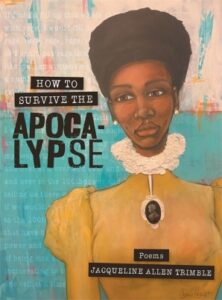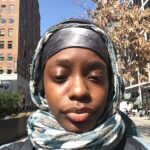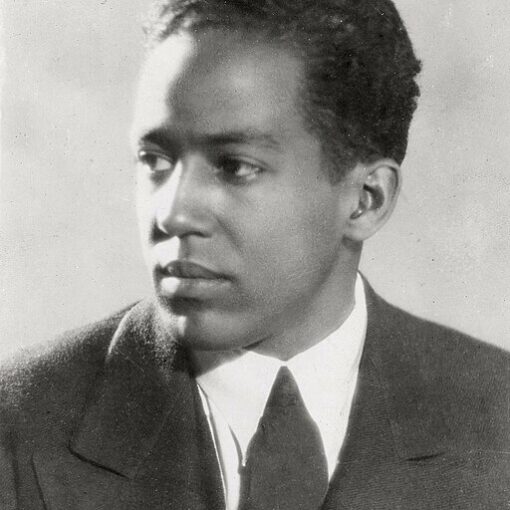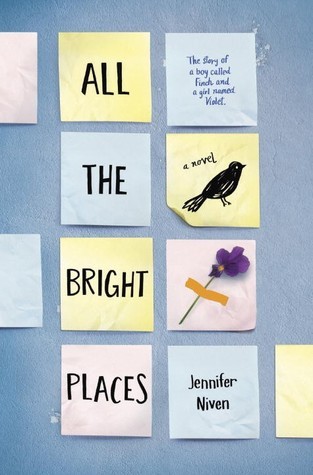 How to Survive the Apocalypse is poetry at a sensual level, as if my own memories of the South took space on a dinner plate and offered smells, tastes, and mixed anticipation. The text includes 45 poems of Jacqueline Allen Trimble’s own volition. Her unique authorship drips off the page, like a subtle perfume or perhaps gasoline. In “The Fire Shut up in my Bones” (p. 40) and “Kneeling Is No Longer an Option” (p. 16), the words seem to catch fire and illuminate parts of our emotional reality that live in the dark. The theme of the completed book is how to survive an upheaval of the soul. The author describes a uniquely American apocalypse or psychological landscape in which emotional faculties perpetually face catharsis at the hands of intergenerational turmoil. The poetry is timely, timeless, and time stamped by Trimble’s perspective and her ability to channel her ancestors, and she writes like her descendants depend on it. Her passion for the art emboldens each piece with nods to faithful praxis of prayer, cooking, dancing, and raising children. The poetic machine expands at the hands of Trimble and demands an almost physical presence in my imagination. Each piece is like a ride at an amusement park of American dystopian tendency. As an artistic function, this book is parallel with Banksy’s mixed media installation, “Dismaland,” a polemic representation of American apocalyptic tendencies during late-stage capitalism.
How to Survive the Apocalypse is poetry at a sensual level, as if my own memories of the South took space on a dinner plate and offered smells, tastes, and mixed anticipation. The text includes 45 poems of Jacqueline Allen Trimble’s own volition. Her unique authorship drips off the page, like a subtle perfume or perhaps gasoline. In “The Fire Shut up in my Bones” (p. 40) and “Kneeling Is No Longer an Option” (p. 16), the words seem to catch fire and illuminate parts of our emotional reality that live in the dark. The theme of the completed book is how to survive an upheaval of the soul. The author describes a uniquely American apocalypse or psychological landscape in which emotional faculties perpetually face catharsis at the hands of intergenerational turmoil. The poetry is timely, timeless, and time stamped by Trimble’s perspective and her ability to channel her ancestors, and she writes like her descendants depend on it. Her passion for the art emboldens each piece with nods to faithful praxis of prayer, cooking, dancing, and raising children. The poetic machine expands at the hands of Trimble and demands an almost physical presence in my imagination. Each piece is like a ride at an amusement park of American dystopian tendency. As an artistic function, this book is parallel with Banksy’s mixed media installation, “Dismaland,” a polemic representation of American apocalyptic tendencies during late-stage capitalism.
In this review I want to look at only one poem, “Denotation for the People” (p. 31) and outline this incredible theoretical playground that Trimble has forged for the reader, while looking deeply into the reality of liberty and living while black in America. The poem is as follows:
When Spell Check redlined “lynchings”
as if that word did not exist
had not been defined forever
by fire and skin,
I hit “add to dictionary” so fast
I’m sure you felt the world
evolving.
This poem is the shortest in the text, yet still the most poignant. Again, this poem has a rich sensory life that spans multiple continuums in my imagination. The dimensions of this poem span the physical, digital, and spiritual life of sacrifice. Without being macabre, Trimble mentions fire and skin which grapples with the sensory experience of burning flesh. The piece automatically takes on this smell and it floats into the future unfolding on the Internet, where this phenomenon has not yet been reckoned. What does sacrifice mean to a young nation? Does that kind of heartache germinate further into our online identities? And how does the digital space interact with ancestry and the questions we will always have? The poem asks much of the reader in its simplicity, which speaks to the sharpness of the mind and heart of Trimble. I felt the tragedy renewed in this text, if only to breathe an insatiable legacy into the present and into our screens. The last word in the poem is “evolving.” The poem propagates itself, and among the rest of the poems takes its place within evolution. American consciousness is shifting greatly at the hands of the Internet and our sense of history is catching up with the great depths of knowledge available in contemporary spaces. While reading and synthesizing How to Survive the Apocalypse, I have taken another step towards the American genesis of my spirit. Because of Trimble’s honesty, I am evolved.
It is important to remark on the psychological playgrounds that we entertain and question in order to reap the fruits of independence. We must filter our thoughts to form opinions that dictate our perspective of life. This is the most important function of poetry which acts as a roof over anything that could exist. If there is a young person who wants to pull back the curtain and take a look at the nature of sacrifice for freedom, this work extrapolates a mystical body from the disembodied and truth from the lifeless. Jacqueline Allen Tremble is a literary gem, and will guide the reader on her way to baptism, and good American cornucopias.
Get the books! Check out How to Survive the Apocalypse by Jacqueline Allen Tremble at BMCC’s Library, the New York Public Library, Brooklyn Public Library, or Queens Public Library.

About the author Rain Marie Robertson is a Literacy Studies Major at BMCC. Hailing from Atlanta, GA, she is often seen around her neighborhood in Harlem and enjoying matcha lattes in Meatpacking (at her other job).

This work is licensed under a Creative Commons Attribution-ShareAlike 4.0 International License.




